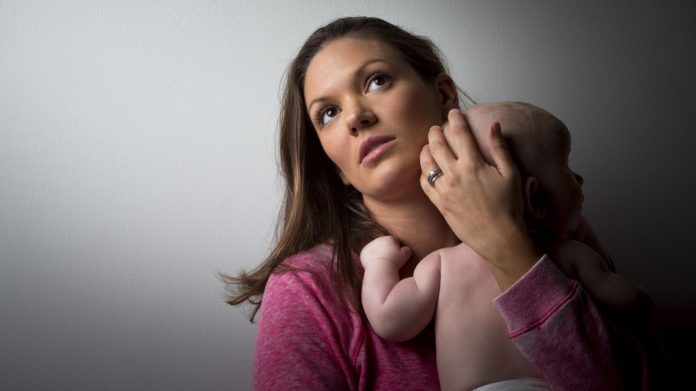New moms deserve a better approach to mental health

For too long pregnant women and new mothers have lived silently with depression and anxiety, afraid to share their struggles and seek treatment because of the stigma that surrounds maternal mental illness.
That is beginning to change as celebrities like Drew Barrymore and Hayden Panettiere and everyday moms talk openly about their experiences. With every story they share, these women prove they are not “bad” mothers but loving parents on a challenging journey.
Yet as postpartum depression, in particular, becomes less taboo, women still find it difficult to get the treatment they want and need.
Despite the increased awareness of the condition, which affects one in seven women, some doctors don’t screen for it and those who do frequently lack the right training and resources to ensure their patients receive help. Research has shown that too few women who experience postpartum depression are treated.
This isn’t acceptable. We cannot set new mothers on a path known to be treacherous and hope they manage to avoid harm. We must instead think of maternal mental health as essential to the well-being of both mother and child; trying to detect mental illness should be as important as any pregnancy-related blood test, sonogram, ultra sound or checkup.
This requires transforming obstetric health care, which may not be as impossible as it seems. Last week, the first lady of New York City, Chirlane McCray, announced a new initiative to screen and treat all pregnant women and new mothers for maternal depression. As many as 15,000 women in the city may experience postpartum depression every year.
Maternal depression IS treatable. Let’s make new mothers feel comfortable seeking help. #ThriveNYC pic.twitter.com/gpAW7fhl10
— Chirlane McCray (@Chirlane) November 17, 2015
The ambitious goal will start with achieving universal screening within the next two years at the city’s public hospitals and Maimonides Medical Center, a nonprofit hospital in Brooklyn. Together those facilities deliver one-quarter of all babies born in New York City.
“For most women it’s a joyous moment in their lives,” McCray tells Mashable. “But because birth is a very big event in a woman’s body, in terms of hormones, emotions, and psychology, sometimes women need time to get back to equilibrium they had. We want doctors to pay a little more attention to mothers.”
McCray says the initiative is still determining how to train doctors to incorporate the screening into visits with sensitivity and cultural competency. These skills are key as mothers who deliver at the public hospitals may be low-income patients, immigrants and women of color, and research shows that the latter receive different levels of care for postpartum depression compared to white women.
Just finding the right opportunity to screen women can be difficult. A large study in Maryland, published in 2014, found that only half of women attended a post-delivery checkup, and that’s typically when doctors screen for postpartum depression, if they do at all.
Major medical organizations, including the American College of Obstetricians and Gynecologists, endorse universal screening, but detecting and treating postpartum depression isn’t as simple as handing a woman a questionnaire about her feelings.
Takes a village to raise a child & ours just got stronger: new initiative aims to screen & treat new moms for maternal depression
#ThriveNYC
— Chirlane McCray (@Chirlane) November 17, 2015
What happens next, says Ann Smith, president of the Postpartum Support International, is crucial.
“When [a mother] is sent to someone who isn’t competent, who isn’t familiar with perinatal depression, she can almost be worse off,” says Smith. “There’s a real sense of ‘I’m not going to get better.'”
Smith, who is involved in the New York City screening initiative, is eager to see how patients are connected with the right medical professionals and treatment options. In her experience, too many women receive the wrong medication. Doctors may also focus on medication to the exclusion of talk therapy, which can leave some new mothers feeling isolated and alone.
Smith views the universal screening goal as an opportunity to train medical staff like nurse practitioners to screen and help treat patients.
It’s also an important reminder that reproductive psychiatrists who focus on perinatal mood disorders can be vital for some patients, but Smith says these specialists aren’t widely accessible, particularly outside of metropolitan cities like New York and San Francisco.
All of these shortcomings make effective screening and treatment feel like a bleak prospect. As Smith points out, though, the status quo is a tremendous improvement from just a few decades ago when doctors and patients rarely talked about postpartum depression, much less knew how to treat it.
The progress is undeniable, but the gains we’ve made against stigma will count as a true victory when all women feel empowered to seek treatment from a medical system that understands and anticipates their needs.
The physical and emotional journey of motherhood, after all, is unlike anything else a woman will experience in her lifetime. It’s time to stop pretending this transformation doesn’t sometimes leave psychological scars.
Simply put, McCray says, “This is common, this is treatable, and we can do better.”
Have something to add to this story? Share it in the comments.
